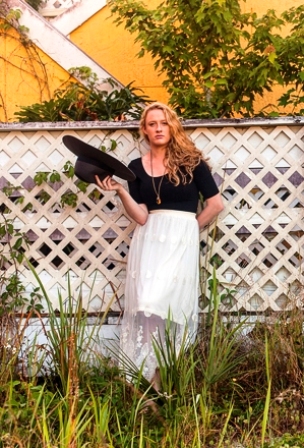Shannon Quinn
 Classically trained, and raised in an area where Cape Breton fiddle music fills the air, Shannon Quinn found herself irresistibly drawn to the Irish fiddling tradition of her ancestors.
Classically trained, and raised in an area where Cape Breton fiddle music fills the air, Shannon Quinn found herself irresistibly drawn to the Irish fiddling tradition of her ancestors.
“I have been playing the fiddle for 20 years,” says Shannon Quinn, who was born and bred in Halifax, Nova Scotia. “I started off with classical violin at age six and then, although I did study classical violin at university, I fell in love with the Irish fiddle around the age of nine and never looked back,”
Thanks to her father, musician Tony Quinn, with whom she still performs as a Celtic folk duo, she had a steady stream of singers and musicians coming through the doors through her youth.
“My grandparents are all from Ireland, and I think I felt a strong connection to my heritage when I was younger. I still do. I was very involved in the Irish dancing community for many years so I was constantly being exposed to Irish music as a child.”
With a music degree from Toronto’s Humber College, Quinn has been touring for the past two years with the internationally renowned Scottish group, The Paul McKenna Band.
While she considers herself a traditional Irish fiddler in terms of ornamentation and general sound, she allows for her classical training to show up in her bowing and vibrato technique.
“My biggest influence growing up was probably Martin Hayes. I saw him perform in Boston when I was 10 years old and for years after that I listened to his albums very regularly. I loved how slow and melodically he played – he made tunes sound like songs. Every time he repeated a tune, it sounded as though it was a different verse, trying to say something different.”
Quinn’s finesse on the fiddle has taken her from Symphony Nova Scotia to Cirque du Soleil and Disney World’s Epcot Centre. She has also performed with The Chieftains and the award-wining group Down with Webster at Massey Hall in Toronto, as well as at Nashville’s Music City Roots and Bluegrass Underground concerts.
Currently into pre-production on her third album, Quinn released her second recording, If All the Young Ladies a year ago. Recorded in Glasgow, it features her singing as well as fiddling. Her first album, The Irwin Lake Sessions was recorded in 2008.
“The fundamental reason I play today is that I am still so in love with it – playing fiddle is when I am in my happy place.”
She has a passion for arranging new tunes and experimenting with her music. Always interested in the history and geography of a tune, Quinn is careful in making modern adaptations.
“I am drawn to obscure tunes that lend themselves to non-diatonic chord changes or have interesting off-beat accents. My favourite Irish composer is Ed Reavy for those reasons, as his tunes are so melodically unexpected. I think a good tune is memorable and a lot of time has an identifying hook within it.”
Her approach to music, she explains, depends on the day.
“If I am suddenly inspired I will definitely drop the day’s to-do list and run with the idea, but I regularly set days aside where I make no plans and just lock myself in a room to be creative from morning until night. I give myself writing and arranging challenges to try and keep my chops up in those areas.”
As a 10 year-old, she set herself the goal of one day playing with famed Cape Breton fiddler Ashley MacIsaac. Her wish came true recently when the duo recorded together for a television production. She also did a western Canadian tour with singer Lennie Gallant, whom she described as one of her favourite lyricists.
More recently, Quinn opened her own music school and recording studio in Halifax.
“I’ve always wanted to open a school because I had such positive experience growing up with music, but I also had negative experiences with different teachers along the way. Through my music and lesson experience I’ve tried to create a balance where – although I have high expectations for students as far as focus, effort and practice – I also realize most kids who take lessons are not trying to become professional musicians or concert violinists.”
Music lessons also instill life skills; self-motivation, accountability, patience, confidence and the ability to handle and overcome failure.
“Studying music develops so much more than just the ability to play an instrument.”



















